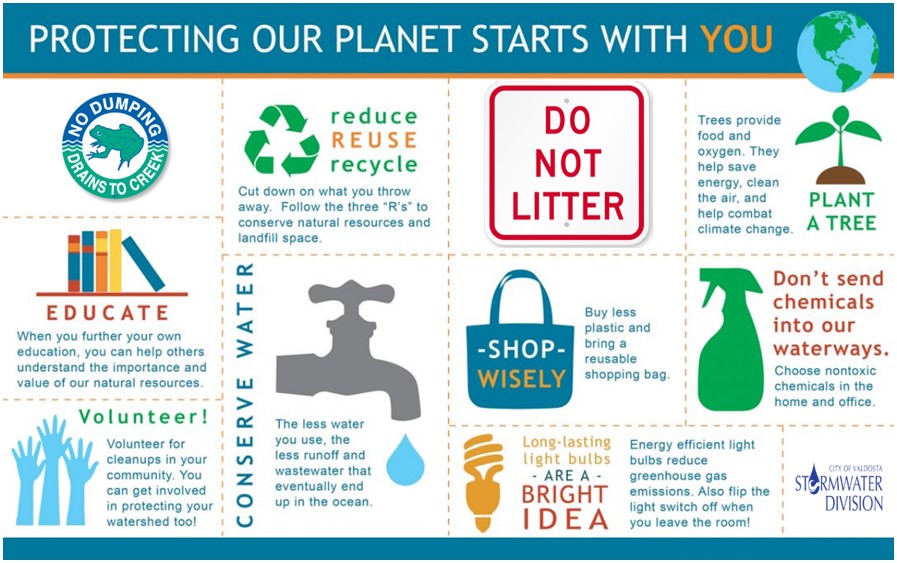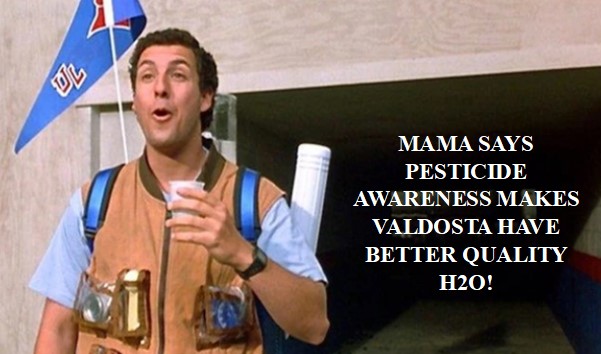Stormwater Tips 2024
August 2024
Mind Your Grease
Fats, oils, and grease (F.O.G) are a real “pain in the drain,” because when cooled they harden and reduce pipe capacity. Decreasing the capacity can cause major blockages which in turn can cause overflows and breaks in the system. A blockage can be costly to homeowners or the City to cleanup if sewer backs up into your house, yard, streets or even the nearest waterbody.
Here are some tips to keep your drains F.O.G – free:
What can YOU do with your leftover Fats, Oil and Grease?
- Discard leftover fat, oil or grease into the trash.
If you dispose your F.O.G into the trash:
- Pour cooled grease into an empty can or plastic container before tossing it in the trash.
- Scrape food scraps from dishes into the trash.
- Collect leftover or expired oils (salad dressing, cooking oils, etc.) in containers; absorb liquids with coffee grounds, cat litter or paper towels; toss in trash.
- Use rubber scrapers and paper towels to remove oil and grease from cookware.
- Avoid using a garbage disposal.
- Put baskets or strainers into sinks to catch food scraps and then empty them in the trash.
April 2024
March 2024
Pesticides – Good for weeds, insects…Bad for stormwater runoff
Pesticides can be useful in controlling weeds and insects and creating well-maintained lawns and landscaped areas. However, they can also become a stormwater concern if stored or used improperly. They pose a potential stormwater pollution risk and threat to drinking water, aquatic plants and animals, and waterbodies used for swimming, fishing, and recreational activities.
The labels on pesticide containers have instructions on proper application, in addition to risks specifically associated with that pesticide. It is important to develop best practices to minimize pesticide pollution in our local waterways.
Below are some tips for keeping pesticides out of stormwater runoff and water bodies:
- Store pesticides away from water sources.
- Try to purchase pesticides that are least toxic to the environment, like insecticidal soap.
- Look for pesticides with low water solubility and high adsorption – ability to bind to soil and plant surfaces – so that they are less likely to contaminate water bodies.
- Only purchase the amount of pesticides you will use during each season.
- Do not apply pesticides if it is windy or within 24 hours of expected rain.
- Do not apply pesticides near open waterbodies and near storm drains.
- Avoid applying pesticides to sidewalks, driveways, or other hard surfaces so that rain does not carry them into storm drains.
- Plant vegetation between areas of pesticide application and any water body, especially when the application area is uphill of the water body.
January 2024
Right Tree, Right Place
Do you want to know: How to pick the right spot to plant a tree?
Many troubles can come by not deciding on the right tree location before you plant:
- Damage to houses through cracked foundations.
- Clogged gutters from leaves.
- Cracked pavement of sidewalks, driveways, porches, and patios.
- Storm damage and electric problems from tree limbs.
- Problems with underground utilities and/or infrastructure.
Here are a few steps to take in consideration before planting a tree on your property.
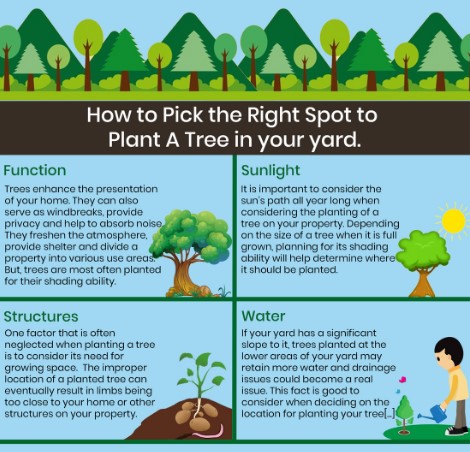
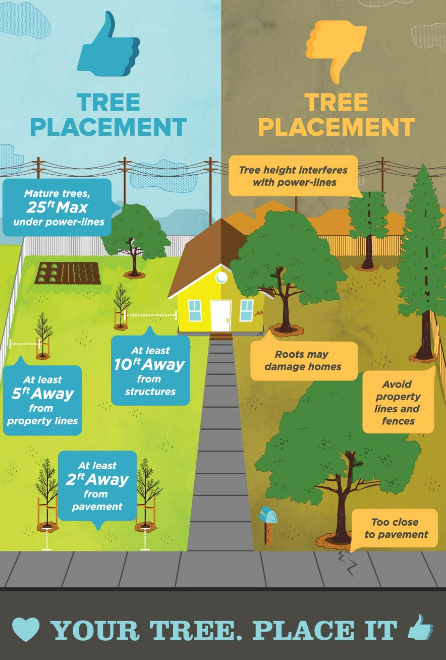
Help regrow Valdosta and reduce environmental impacts!!
December 2023
Winter is one of the best times to plant a tree! Many excellent varieties are available at your local nursery, with some of the best trees available in the winter. Your new tree will use the winter dormant season to establish new roots. When spring arrives, your tree will be on its way to providing shade for generations to come.
While it may seem obvious that planting a tree is a good thing, here are some reasons which may not have occurred to you.
- Well-placed trees can save you money on your utility bills. In the summer, trees shade your roof and windows and cool the air around your house as they breathe. In the winter, evergreens can block cold north winds.
- Trees of course clean the air by creating oxygen and keep our city cooler by reducing the “heat island” effect, caused by concrete and asphalt storing and reflecting heat.
- Trees are increasingly recognized for their importance in managing runoff. Their leaf canopies help reduce erosion caused by falling rain. They also provide surface area where rainwater lands and evaporates. Roots take up water and help create conditions in the soil that promote infiltration.
The best time to plant a tree in Valdosta is between November and March.
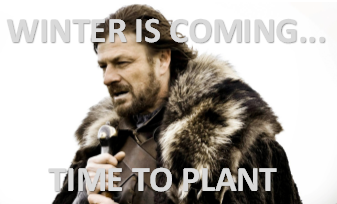
October 2023
Halloween will be here before you can say, “Boo!” So, as you prepare for that spooky, kooky holiday coming up, take a few minutes to incorporate these simple stormwater-friendly tricks and tips into your fall activities.
- Ban that bag
When your little superheroes and princesses go trick-or-treating, be sure they use a reusable bag to collect their treats. Canvas bags and pillowcases are great alternatives to plastic or even paper bags, and they are much sturdier.
- Don’t be a trash monster
Remind your little trick-or-treaters to never throw candy wrappers on the ground as they’ll flow into our creeks and rivers once the next rain event happens.
- Recycle costumes
When photos last forever, and every Halloween requires a new look, A LOT of costumes end up getting worn once and discarded. Instead of tossing your costumes in the trash, or banishing them to a box in the attic, why not give them to charity? You can also trade with family and/or friends, OR stuff ‘em and use them in your garden as scarecrows!
- Volunteer/Participate
- October 20: Rivers Cleanup
- November 14: Fall Electronic Recycling Day
- November 9: "Love Where You Live” Monthly Road Cleanup
- November 21: "Love Where You Live” Monthly Road Cleanup
- December 16: "Love Where You Live” Monthly Road Cleanup
For more information or to volunteer, please call Angela Bray at 229.259.3530. Remember, only rain goes down the storm drain!
